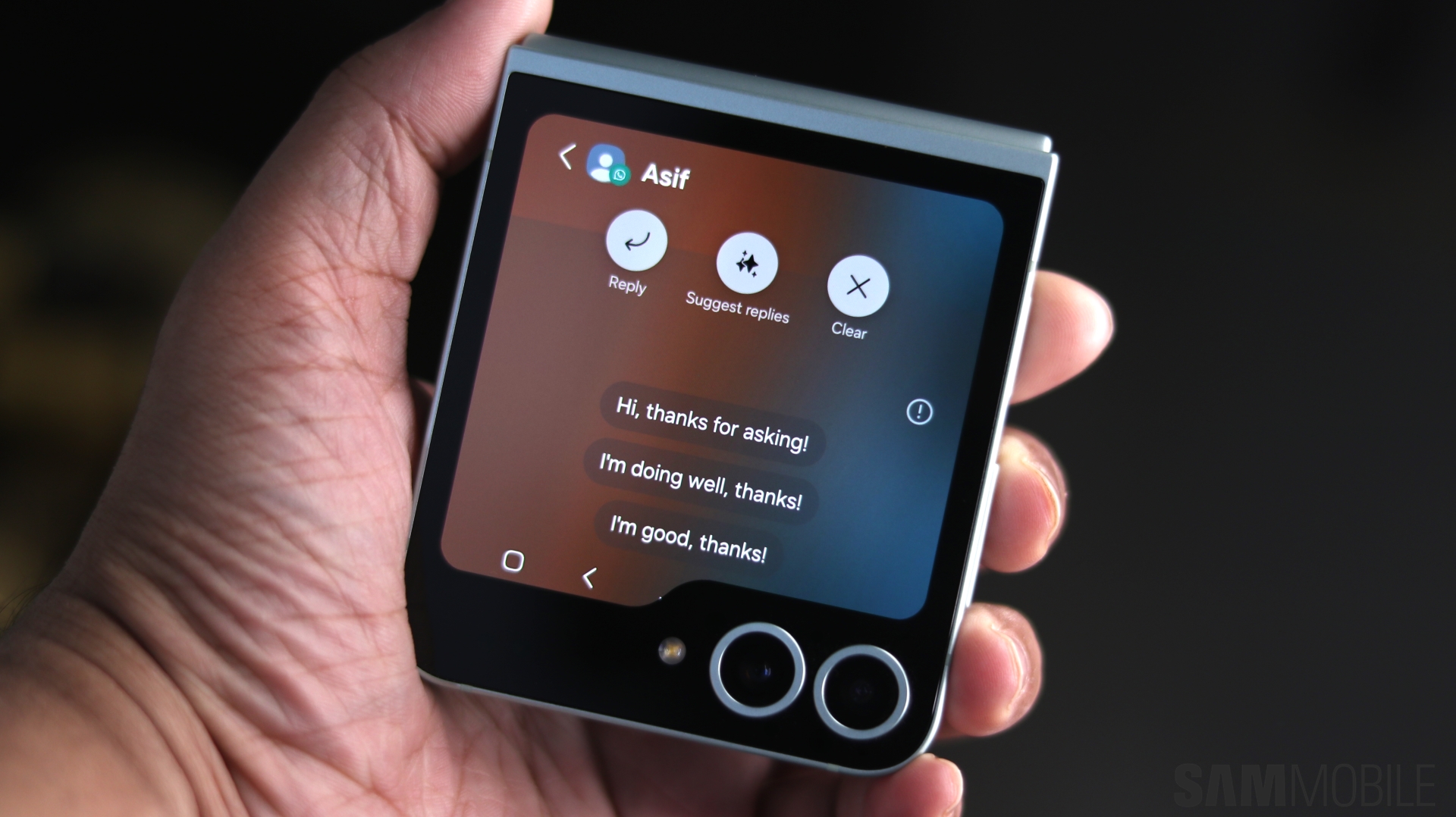Chat Assist is among the numerous Galaxy AI-powered features available for millions of Galaxy phones, including the new Galaxy Z Flip 6. The latter device takes it to another level through Suggested Replies, which leverages AI to make text-based communications faster and more accessible. The same AI-based feature that analyzes your conversation to cook up the best replies is also available for the latest Galaxy Watches. It makes it possible for smartwatch users to send quick replies from their wrists.
It all sounds good on paper, but AI-powered text-based messaging has also caused a bit of controversy, as some feel like this technology brings us even closer to a soulless dystopian future and the further degradation of the social fabric and human interactions.
But I'm beginning to wonder if AI technologies like Chat Assist and Suggested Replies could have the exact opposite effect and jolt people back into reality instead of pushing them further down a dystopian rabbit hole. Instead of confounding the issue, maybe AI-based text chatting will highlight it and help people snap out of it.
Why defend the thing that dehumanized human interactions?
Some of you might be old enough to remember that there was a time when text-based communications weren't at the front and center of human interaction. For the most part, SMS and emails were tools people used to set up face-to-face meetings or even phone calls.
And the very notion that two people could have a serious argument over text or because of a text message was silly, at least for the most part. Even in the early days, most people understood text messaging was an incomplete and inadequate way to communicate. If there was a misunderstanding, it was better to clear it up in person rather than dragging out an awkward text conversation.
The internet, better services, the rise of social media, and smartphones have changed all that. Over time, text-based communications have become more accessible (and even cheaper), and people started using it more and more every day. The change didn't happen overnight, but some feared where this shift in human behavior could lead.
This gradual rise in the popularity of text messaging caused many people to worry about text-based communication technologies eroding the social fabric and leading people down a dark path where social interactions are less meaningful and deep.
It's understandable why some still believe that to be true. Text-based communications lack many of the basic elements that make up human interactions. There's no body language involved, no immediate feedback to and from whoever you're chatting with, no aural component aside from incoming text alerts, and there is barely an adequate way to convey tone. Text-based communications leave a lot of room for error, guesswork, and filling in the gaps.
As always, it can be a very useful tool, but you might understand why some believe it can be dangerous in the long term if misused in a way that slowly replaces direct human interactions. And some might say it already has.
More after the video
So then, the next step toward our dystopian demise is AI-based Chat Assist and Suggested Replies, right? Well, I'm not so sure about that. Or at least, I hope that's not the case, and here is why I wonder if AI might come to our rescue this time.
For once, AI might save us from ourselves
Instead of pushing digital-based human interactions further into the mud, I wonder if AI-based text communications might be the thing that breaks our text-based “addiction” and stops us from “misusing” the tool. It's easy to see why some might fear that adding this element of AI to text-based communications could dehumanize social interactions even further, but maybe that's not what is going to happen.
Think about it. If you know the person you're chatting with uses AI to reply to your messages — the same AI tools you have on your phone — then maybe this will sterilize text messaging to the point where you won't care so much about it. Maybe people will start using text as they used too many years ago, for basic communications instead of trying to carry out meaningful conversations over a simplistic digital medium.
If someone always uses AI to text you back, would you even try to have a more meaningful conversation over text with that contact? I think not. And if we all start using AI for text-based communications, would we stop caring as much about the medium? Maybe so.
What I find almost ironic is that the people who were against the idea of widespread text messaging in the first place are seemingly defending text messaging against the rise of AI. It's as if they accepted their defeat and view text messaging as the last bastion of human interactions, even though text messaging is the thing they used to fight against. So, why defend that which pushed you down the wrong path, to begin with?
The story continues after the video
Call me optimistic, but I wonder if AI could have the opposite effect and dehumanize the medium itself, i.e., text-based communications, rather than dehumanizing us. Maybe AI will dispel whatever magic we're all under and make text messaging meaningless enough to the point where it will jolt us back to reality.
In any case, chances are we'll all be talking to robots soon, but we'll be the ones deciding if it's kind of pointless in the end. I guess we'll have to wait and see, but until then, I hope AI will come to our rescue at least once.
Instead of fearing that AI will break our social fabric even further by dehumanizing text-based communications, maybe we could all hope that AI will take the last human element out of text messaging to the point where we all see it for what it is — merely a tool to carry out messages when necessary, in a hurry, and not a platform for creating or maintaining meaningful social relationships.
In the end, I think the answer may lie somewhere in between, and the near future won't drastically change how we do things. We won't stop trying to hold meaningful conversations over text, as we can't just ignore the fact that we live in the age of the internet where relationships barely have any borders. However, the AI element could help us draw clearer lines between the conversations that might be worth our extra human effort and which ones are not.






